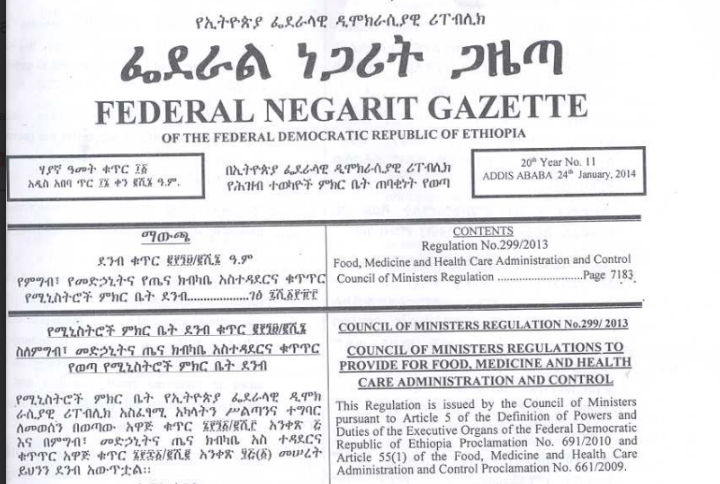Fill out the form below to receive the complete PDF guide directly in your inbox. This resource provides clear, step-by-step guidance to help you make the most of the information we’ve prepared for you.
Ethiopia
Food, Medicine and Health Care Administration and Control Council of Ministers Regulation No. 299/2013
Issued by the Council of Ministers, this regulation provides the detailed legal framework for implementing Ethiopia’s Food, Medicine and Health Care Administration and Control Proclamation (No. 661/2009). It establishes specific rules governing food safety, medicine registration and importation, clinical trials, and post-marketing surveillance. The regulation details the duties of medicine importers and distributors to establish a pharmacovigilance system and report adverse reactions. It also covers environmental health, control of tobacco products, and the professional code of conduct for healthcare practitioners.

Use Cases
- The Ethiopian Food, Medicine and Health Care Administration and Control Authority – Implement and Enforce Regulations: To use this regulation as the legal basis for registering medicines, issuing permits for food and drug importation, conducting post-marketing surveillance, and taking measures against non-compliance.
- Food Manufacturers and Importers – Ensure Food Safety and Quality: To comply with specific requirements for manufacturing, registration, storage, labeling, fortification, and importation to ensure their products are safe for public consumption.
- Medicine Manufacturers and Importers – Obtain Market Authorization: To follow the stipulated procedures for medicine registration, which require demonstrating compliance with good manufacturing practice and providing evidence of the drug’s safety, quality, and efficacy.
- Importers and Distributors – Conduct Post-Marketing Surveillance: To fulfill their legal obligation to establish a pharmacovigilance system for monitoring the safety of medicines they handle and to report any unexpected adverse drug reactions to the Authority.
- Clinical Trial Sponsors and Researchers – Adhere to Ethical Standards: To conduct clinical trials on humans only after obtaining authorization from the Authority, which is granted after a thorough review of the scientific, legal, and ethical aspects of the research proposal.
- Health Professionals – Uphold the Code of Conduct: To adhere to the professional and ethical standards outlined in the regulation, including rules on patient confidentiality, advertising services, and avoiding unprofessional conduct.
Key takeaways you'll learn
The resource’s purpose is to provide a comprehensive and legally binding framework for the administration and control of food, medicines, and healthcare services in Ethiopia. It aims to operationalize the national proclamation by setting detailed standards and procedures to protect public health.
- Comprehensive Regulatory Scope: This regulation covers everything from food safety and medicine control to clinical trials, tobacco products, professional licensing, and environmental health, creating a single, integrated legal instrument for public health oversight.
- Mandatory Post-Marketing Surveillance for Industry: The regulation legally requires medicine importers and distributors to establish their own pharmacovigilance systems to monitor drug safety and report adverse reactions, making post-marketing surveillance a condition of doing business.
- Strict Control over Medicine Registration: It establishes a rigorous, multi-step process for medicine registration, requiring proof of good manufacturing practice, dossier evaluation, and laboratory testing before market authorization is granted.
- Regulation of Clinical Trials: It formalizes the oversight of clinical trials, requiring explicit authorization from the Authority based on scientific and ethical evaluation, and establishing a Clinical Trial Ethics Committee.
- Legal Framework for Professional Conduct: The regulation sets legally enforceable standards for the conduct of health professionals, defining unprofessional conduct, patient confidentiality, and rules for advertising, and establishing a committee to handle complaints.


